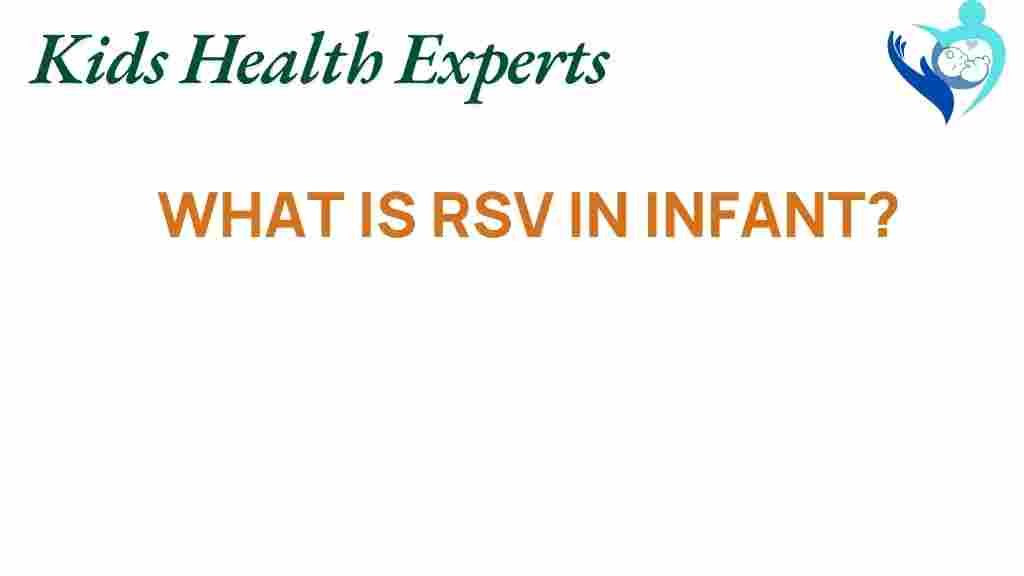Unraveling the Mystery of RSV in Infants: What Every Parent Should Know
As a parent, understanding the health challenges your child may face is crucial. One such challenge is RSV, or respiratory syncytial virus, which is particularly concerning for infants. This article aims to provide a comprehensive guide on RSV, its symptoms, prevention strategies, treatment options, and the importance of pediatric health. By familiarizing yourself with this viral infection, you can better protect your child and navigate the complexities of parental guidance during RSV season.
What is RSV and Why is it Important for Infants?
RSV is a common respiratory virus that typically causes mild, cold-like symptoms in adults and older children. However, for infants, especially those under the age of two, RSV can lead to serious respiratory issues, including bronchiolitis and pneumonia. Understanding the implications of respiratory syncytial virus is vital for every parent. Here’s what you need to know:
- RSV is highly contagious and spreads through respiratory droplets.
- Most children will have been infected with RSV by their second birthday.
- Premature infants, those with heart or lung conditions, or weakened immune systems are at greater risk.
Recognizing the Symptoms of RSV
Identifying the symptoms of RSV early can lead to timely intervention. Common symptoms to watch for include:
- Runny nose: Often the first sign, it may be accompanied by nasal congestion.
- Cough: A persistent cough can develop, leading to wheezing.
- Fever: A mild to moderate fever may occur.
- Difficulty breathing: Babies may exhibit rapid breathing or struggle to breathe.
- Decreased appetite: Infants may refuse to eat or drink due to discomfort.
If your child displays any signs of severe illness, such as blue-tinted lips or face, extreme lethargy, or difficulty breathing, seek emergency medical help immediately.
Prevention Strategies for RSV
- Practice good hygiene: Regular handwashing with soap and water can significantly reduce the spread of RSV.
- Avoid sick individuals: Keep your infant away from people exhibiting cold-like symptoms.
- Limit exposure: During RSV season, limit your infant’s exposure to crowded places.
- Immunization: In certain cases, a medication called palivizumab is given to high-risk infants to prevent RSV. Consult your pediatrician about this option.
Creating a Healthy Environment
Maintaining a clean and healthy environment can also help minimize the risk of RSV:
- Disinfect surfaces frequently, especially in shared spaces.
- Ensure that your infant’s living area is well-ventilated.
- Avoid smoking in the home, as smoke can irritate the respiratory system.
Treatment Options for RSV
If your infant contracts RSV, treatment will focus on relieving symptoms. Here’s what you can expect:
- Home care: Most infants with RSV can be managed at home. Ensure they stay hydrated and get plenty of rest.
- Steam therapy: Using a humidifier or taking your baby into a steamy bathroom can help ease breathing.
- Medication: Over-the-counter medications may help reduce fever and discomfort. Always consult your pediatrician before administering any medication.
- Hospitalization: In severe cases, hospitalization might be necessary for oxygen therapy or intravenous (IV) fluids.
Step-by-Step Care for RSV at Home
Managing RSV at home requires a few key steps:
- Monitor symptoms: Keep a close eye on your infant’s symptoms and seek medical advice if they worsen.
- Stay hydrated: Ensure your infant drinks plenty of fluids to prevent dehydration.
- Provide comfort: Use soft, soothing methods to keep your baby comfortable, like cuddling and gentle rocking.
- Follow pediatrician’s advice: Always adhere to the guidance provided by your healthcare provider.
When to Seek Medical Help
Knowing when to seek medical attention is crucial for your child’s health. Contact your pediatrician if:
- Your infant exhibits severe difficulty in breathing.
- They have a high fever that does not respond to medication.
- Your baby is lethargic or unresponsive.
- You notice any signs of dehydration, such as dry mouth or lack of tears.
Parental Guidance: Supporting Your Infant Through RSV
As a parent, your support is invaluable during your infant’s battle with RSV. Here are some tips for providing the best care:
- Educate yourself: Familiarize yourself with RSV and its effects on infants. Knowledge is power.
- Stay calm: Your anxiety can affect your infant. Maintain a calm demeanor to create a reassuring environment.
- Connect with other parents: Sharing experiences can provide emotional support. Consider joining parenting groups or forums.
- Keep communication open: Regularly talk to your pediatrician about your concerns and any changes in your infant’s condition.
Internal and External Resources
For more information on pediatric health and RSV, consider visiting this helpful resource. Additionally, consult with your healthcare provider for personalized advice.
Conclusion
Understanding RSV in infants is essential for every parent. By recognizing the symptoms, implementing effective prevention strategies, and knowing how to treat RSV, you can help ensure your child remains healthy. Always be vigilant and seek medical assistance when necessary. With proper care and guidance, you can navigate the challenges of RSV and support your infant’s health through this viral infection.
This article is in the category Conditions and created by KidsHealthExperts Team
